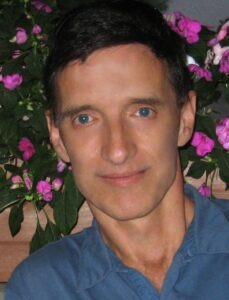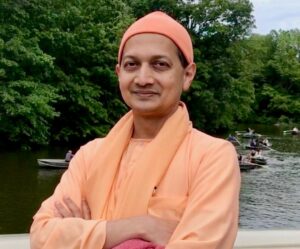 Stephen Cope is the Scholar Emeritus at the renowned Kripalu Center in Stockbridge, Massachusetts. He is the author of many best-selling books on the topic of yoga and meditation. For over thirty years, his interest has been in bringing important but esoteric yoga scriptures to the mainstream, including, most recently, the two-thousand-year-old spiritual classic called The Bhagavad Gita, or “The Song of God.” His new book on The Gita, entitled The Dharma of Difficult Times, will be released later this year.
Stephen Cope is the Scholar Emeritus at the renowned Kripalu Center in Stockbridge, Massachusetts. He is the author of many best-selling books on the topic of yoga and meditation. For over thirty years, his interest has been in bringing important but esoteric yoga scriptures to the mainstream, including, most recently, the two-thousand-year-old spiritual classic called The Bhagavad Gita, or “The Song of God.” His new book on The Gita, entitled The Dharma of Difficult Times, will be released later this year.
Some of the points discussed in this conversation:
- Stephen’s background.
- Dharma – “Sacred Duty”, “That course of action most conducive to your spiritual development” – with particular reference to the Bhagavad Gita.
- Indra’s net – the connection between the soul’s good and the common good.
- Dharmic hierarchies: individuals, families, communities, nations, planets.
- The evolutionary opportunities of the human realm as compared with higher realms.
- Being honest, humble, and discreet about one’s progress on the path.
- The value of long-term practice.
- The value of meditation for musicians, athletes, and others whose success demands sharp focus.
- The four pillars of karma yoga: discerning one’s dharma, applying oneself to it, being unattached to the outcome, and “turning it over to God”.
- Overcoming the habit of reaching and grasping. The distinction between motivation and grasping.
- How to determine your dharma.
- You can still live your dharma even if your job does not fulfill it.
- You may have many dharmas, both simultaneously and sequentially.
- To live your dharma is to surrender your life to a higher power and become a channel through which the world benefits.
- Examples from the lives of Whitman, Beethoven, Frost, Gandhi, Keats, etc.
- The Gospel of Thomas: “If you bring forth what is within you, what is within you will save you, if you do not bring forth what is within you, what is within you will destroy you”.
- Suffering can break us open and enable us to receive new information.
- Just vs. unjust wars.
- Living your dharma may require sacrificing some attractive things that are not aligned with it.
- During periods of dharma transition, we may experience doubt and uncertainty.
- The importance of commitment: “Boldness has genius, power, and magic in it.”
- Living a disciplined and holy life bears fruit. “The means collect around sattwa.”
- Focusing our energy and attention rather than scattering it.
- The difference between happiness and fulfillment.
- Fulfillment independent of gain and loss.
Books:
- The Great Work of Your Life: A Guide for the Journey to Your True Calling (Discussed in this interview)
- Yoga and the Quest for the True Self
- The Wisdom of Yoga: A Seeker’s Guide to Extraordinary Living
- Deep Human Connection: Why We Need It More than Anything Else
Website: stephencope.com
Discussion of this interview in the BatGap Community Facebook Group.
Interview recorded May 29, 2021
Video and audio below. Audio also available as a Podcast.
YouTube Video Chapters:
- 00:00:00 – Introduction to Buddha at the Gas Pump
- 00:04:14 – The Definition of Dharma and Its Connection with the Common Good
- 00:07:48 – The concept of dharma and its impact on individuals, families, and society
- 00:11:13 – Higher Beings and Our Relationship with Them
- 00:14:48 – Discovering the Dharma
- 00:18:11 – The Importance of Underrating Oneself
- 00:21:42 – Everything is Already Okay
- 00:25:04 – The Effects of Meditation on Young Musicians
- 00:28:37 – The Contemplative Tradition’s View on Mastery
- 00:31:55 – Finding Your Dharma
- 00:35:14 – Finding Your Duty
- 00:38:40 – Finding Fulfillment in Your Dharma
- 00:42:21 – Finding the Open Door
- 00:45:57 – Fulfilling your Dharma and making a significant impact
- 00:49:16 – Listening for the Call of the Times
- 00:53:05 – Beethoven’s Dedication to his Gift
- 00:56:43 – The Practice of Letting Go
- 01:00:17 – The Self’s behavior and suffering leading to enlightenment
- 01:03:46 – Gandhi’s View on Violence and War
- 01:07:17 – Exceptions to Oppression
- 01:10:40 – Living Unknown
- 01:14:22 – The Mystery of Sacrifice and Dharma
- 01:17:43 – The Period of Certitude and Doubt
- 01:20:59 – The Conflict of the Heart and Mind
- 01:24:33 – All is Brahman
- 01:27:54 – The Power of Taking Risks and Committing
- 01:31:17 – Support from Higher Intelligence
- 01:35:00 – The Fruition and Importance of Ethical Practice
- 01:38:12 – Finding Fulfillment through Balance and Wisdom
- 01:41:37 – The Impact of Concentration Levels on Book Publishing
- 01:45:12 – Schedule Change: Lawrence Freeman – Work with the Dalai Lama
Podcast: Play in new window | Download
Subscribe: Apple Podcasts | Spotify | Android | Email | TuneIn | RSS | More


